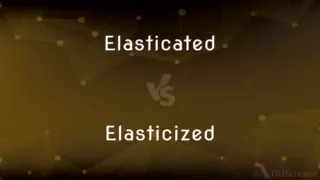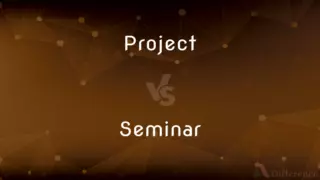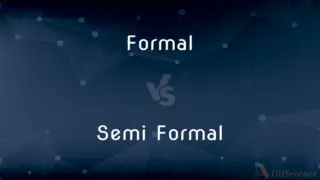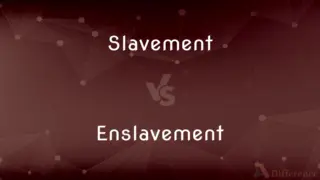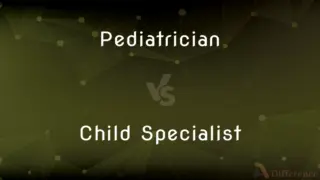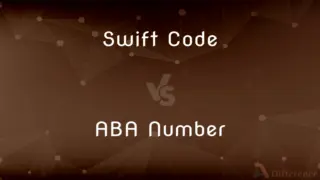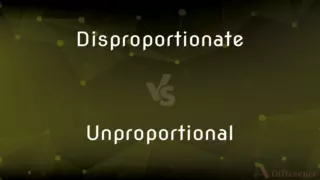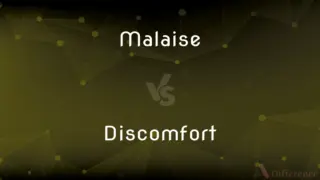Echopraxia vs. Echolalia — What's the Difference?
By Tayyaba Rehman — Updated on August 18, 2023
Echopraxia is the involuntary imitation of another person's actions, while echolalia is the involuntary repetition of another person's spoken words.
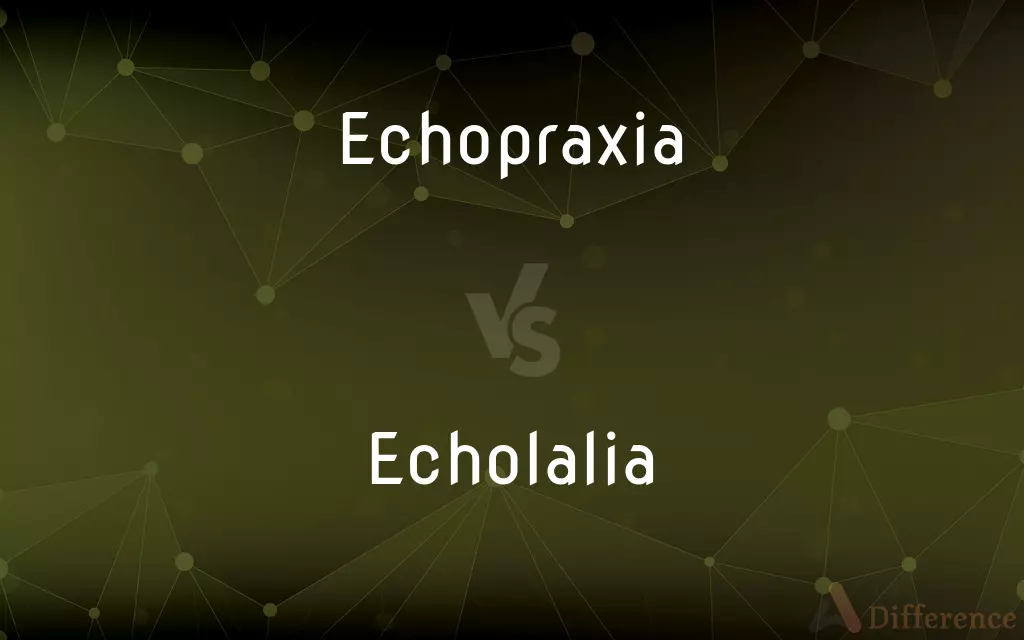
Difference Between Echopraxia and Echolalia
Table of Contents
ADVERTISEMENT
Key Differences
Echopraxia and echolalia are both manifestations of a tendency to involuntarily mimic external stimuli, but they differ in their modes.
Tayyaba Rehman
Aug 18, 2023
In therapeutic settings, understanding echopraxia and echolalia can be pivotal. Echopraxia, meanwhile, might be utilized in physical therapy settings where guided motor imitation can aid in rehabilitation.
Tayyaba Rehman
Aug 18, 2023
Echopraxia relates to the realm of actions and motor activities, while echolalia is rooted in the realm of speech and verbal repetition.
Tayyaba Rehman
Aug 18, 2023
In echopraxia, an individual may observe someone clapping their hands and then, without conscious intention, begin clapping themselves. On the other hand, in echolalia, if someone hears a phrase or a word, they might immediately repeat it aloud, even if it's out of context or doesn't make sense in the given situation.
Tayyaba Rehman
Aug 18, 2023
Echopraxia might manifest in disorders like Tourette's Syndrome, where individuals can involuntarily mimic gestures or actions they observe. Meanwhile, echolalia is often observed in conditions such as autism, where an individual might repetitively echo words or phrases either immediately after hearing them or after a delay.
Tayyaba Rehman
Aug 18, 2023
ADVERTISEMENT
Comparison Chart
Definition
Involuntary imitation of actions
Involuntary repetition of spoken words
Tayyaba Rehman
Aug 18, 2023
ADVERTISEMENT
Definitions
Echopraxia
Involuntary mirroring of physical activities.
As the crowd clapped, his echopraxia made him join in without realizing.
Tayyaba Rehman
Aug 18, 2023
Echolalia
Involuntarily echoing speech without understanding its meaning.
She watched the foreign film and, due to her echolalia, repeated the unfamiliar phrases.
Tayyaba Rehman
Aug 18, 2023
Echopraxia
The reflexive repetition of observed gestures.
Watching the chef chop vegetables, his echopraxia caused him to mimic the motion.
Tayyaba Rehman
Aug 18, 2023
Echolalia
Reflexive verbal imitation observed in some neurological conditions.
Though he didn't understand the joke, his echolalia made him repeat the punchline.
Tayyaba Rehman
Aug 18, 2023
Echopraxia
An automatic imitation of another's actions.
When he saw the man waving, he experienced echopraxia and began waving too.
Tayyaba Rehman
Aug 18, 2023
Echolalia
Echolalia is the unsolicited repetition of vocalizations made by another person (when repeated by the same person, it is called palilalia). In its profound form it is automatic and effortless.
Tayyaba Rehman
Jan 26, 2020
Echopraxia
Replicating movements without intentional control.
Upon seeing the dancer, his echopraxia made him mirror her steps.
Tayyaba Rehman
Aug 18, 2023
Echolalia
Automatic repetition of vocalizations made by another person.
He responded to the teacher's question with echolalia, repeating her last word.
Tayyaba Rehman
Aug 18, 2023
Echopraxia
Unconscious echoing of another's bodily motions.
Witnessing the woman nod, his echopraxia compelled him to nod back.
Tayyaba Rehman
Aug 18, 2023
Echolalia
Unconscious replication of heard speech, often found in autism.
After hearing the song's chorus, his echolalia led him to sing it back immediately.
Tayyaba Rehman
Aug 18, 2023
Echopraxia
Echopraxia (also known as echokinesis) is the involuntary repetition or imitation of another person's actions. Similar to echolalia, the involuntary repetition of sounds and language, it is one of the echophenomena ("automatic imitative actions without explicit awareness").
Tayyaba Rehman
Jan 26, 2020
Echolalia
The act of mirroring back spoken words or phrases.
Upon hearing the word hello, his echolalia prompted him to echo hello back.
Tayyaba Rehman
Aug 18, 2023
Echopraxia
Meaningless repetition or imitation of the movements of others as a symptom of psychiatric disorder.
Tayyaba Rehman
Jan 26, 2020
Echolalia
Meaningless repetition of another person's spoken words as a symptom of psychiatric disorder.
Tayyaba Rehman
Jan 26, 2020
Echopraxia
The involuntary imitation of movements made by others, sometimes occurring in people with schizophrenia and certain other mental disorders.
Tayyaba Rehman
Jan 26, 2020
Echopraxia
The involuntary repetition or imitation of the observed movements of another.
Tayyaba Rehman
Jan 26, 2020
Echolalia
The repetition of words or phrases spoken by others, often occurring in people with autism spectrum disorder and certain other mental disorders.
Tayyaba Rehman
Jan 26, 2020
Echolalia
(clinical psychology) The immediate, involuntary, and repetitive echoing of words or phrases spoken by another.
Tayyaba Rehman
Jan 26, 2020
Echolalia
An infant's repetitive imitation of vocal sounds spoken by another person, occurring naturally during childhood development.
Tayyaba Rehman
Jan 26, 2020
Echolalia
Any apparently meaningless, repetitious noises, especially voices.
Tayyaba Rehman
Jan 26, 2020
Echolalia
(psychiatry) mechanical and meaningless repetition of the words of another person (as in schizophrenia)
Tayyaba Rehman
Jan 26, 2020
FAQs
How do echopraxia and echolalia relate to the brain's mirror neuron system?
Echopraxia and echolalia both involve the brain's mirror neuron system, which activates both when we perform and observe actions or speech.
Tayyaba Rehman
Aug 18, 2023
Are echopraxia and echolalia connected to specific medical conditions?
Yes, echopraxia is often associated with conditions like Tourette's Syndrome, while echolalia is commonly seen in individuals with autism.
Tayyaba Rehman
Aug 18, 2023
Are echopraxia and echolalia always indicative of a neurological disorder?
Not necessarily. While they can be symptoms of certain disorders, brief instances of echopraxia or echolalia can occur in typical development or in specific situations.
Tayyaba Rehman
Aug 18, 2023
What is echopraxia?
Echopraxia is the involuntary imitation of another person's actions without an intentional motive.
Tayyaba Rehman
Aug 18, 2023
How common are echopraxia and echolalia in the general population?
Both are more commonly observed in certain neurological or developmental disorders, but exact prevalence in the general population varies and is not well-documented.
Tayyaba Rehman
Aug 18, 2023
How do echopraxia and echolalia differ from other repetitive behaviors?
Echopraxia involves the imitation of actions, and echolalia involves the repetition of speech, while other repetitive behaviors may not involve imitation or repetition of external stimuli.
Tayyaba Rehman
Aug 18, 2023
What is echolalia?
Echolalia is the automatic and involuntary repetition of words or phrases that one hears, often without understanding their context or meaning.
Tayyaba Rehman
Aug 18, 2023
Can echopraxia and echolalia be treated or managed?
Yes, depending on the underlying condition causing these behaviors, various therapeutic interventions can help manage or reduce their occurrence.
Tayyaba Rehman
Aug 18, 2023
Do echopraxia and echolalia serve a purpose in some individuals?
In some cases, especially in individuals with autism, echolalia can serve as a bridge to meaningful, spontaneous language. Echopraxia, in therapeutic settings, can aid in physical rehabilitation through guided imitation.
Tayyaba Rehman
Aug 18, 2023
Can adults exhibit echopraxia and echolalia, or is it mostly observed in children?
Both behaviors can be observed in adults and children, but echolalia is especially common in young children as a part of typical language development.
Tayyaba Rehman
Aug 18, 2023
Author Spotlight

Written by
Tayyaba RehmanTayyaba Rehman is a distinguished writer, currently serving as a primary contributor to askdifference.com. As a researcher in semantics and etymology, Tayyaba's passion for the complexity of languages and their distinctions has found a perfect home on the platform. Tayyaba delves into the intricacies of language, distinguishing between commonly confused words and phrases, thereby providing clarity for readers worldwide.


